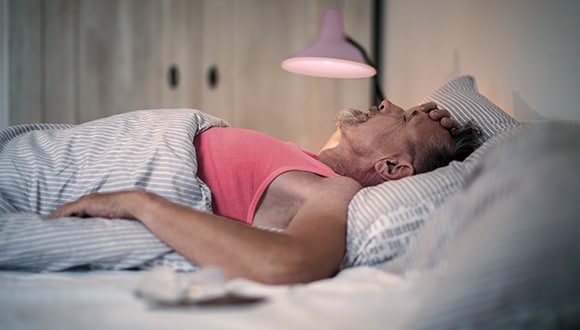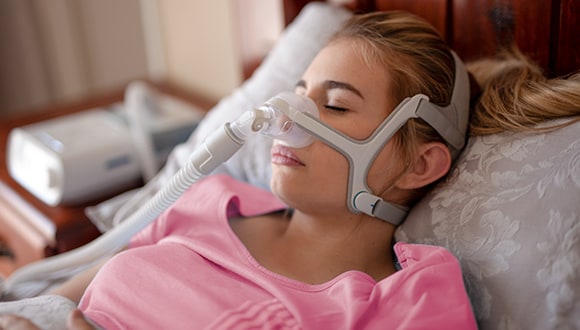Sleep apnoea: symptoms, causes and how it affects your health
Published January 2023 | 5 min read
Expert contributor Dr Moira Junge, CEO of the Sleep Health Foundation
Words by Angela Tufvesson
Sleep apnoea can have a big impact on your everyday wellbeing and long-term health. The condition is highly treatable, starting with lifestyle changes.
Do you wake feeling tired after a full night’s sleep? 5% of Aussies have this condition which can affect your health.
If this sounds like you, it could be a sign you have sleep apnoea – a potentially serious and increasingly common sleep disorder that happens when your throat muscles relax too much during sleep.
Because sleep apnoea happens while you’re asleep, it can be difficult to detect, explains Dr Moira Junge, CEO of the Sleep Health Foundation.
“It's a debilitating condition but it's estimated that [approximately] 80% of sleep apnoea is undiagnosed,” she says. “Most people don't know they've got it.”
The good news is sleep apnoea can be treated with lifestyle changes and medical therapies.
What is sleep apnoea?
Sleep apnoea is when your breathing stops and starts when you’re sleeping. “People stop breathing; sometimes for 10 seconds, sometimes it's a minute,” says Dr Junge.
The most common type is ‘obstructive sleep apnoea’, which happens when your throat is partly or completely blocked throughout the night. These episodes are called an ‘obstruction’ and they cause you to stop breathing.
Obstructive sleep apnoea is a common sleep disorder in Australia, according to a 2021 report commissioned by the Sleep Health Foundation.
Central sleep apnoea is a rarer form of the condition that happens when your brain doesn’t send proper signals to the muscles that control your breathing.
Complex sleep apnoea syndrome, also known as ‘treatment-emergent central sleep apnoea’, occurs when someone has both obstructive sleep apnoea and central sleep apnoea.
Sleep apnoea degrees of severity
When you have sleep apnoea, your breathing can be interrupted hundreds of times a night. Most of the time, you’re not aware of these interruptions.
“A lot of the time people say it was their partner who witnessed them stop breathing and panicked,” says Dr Junge. “It can be really frightening.”
As a general guide:
- mild sleep apnoea is classified as between five and 14 interruptions per hour
- moderate sleep apnoea is between 15 and 29 interruptions
- severe sleep apnoea is more than 30 interruptions.
Sleep apnoea symptoms
“Nearly everyone with sleep apnoea is known to be a fairly noisy snorer,” says Dr Junge. Other common symptoms include:
- poor quality sleep and pauses in breathing while you’re sleeping, which other people may notice
- waking up gasping or choking
- tossing and turning during sleep
- dry mouth and headaches after waking up
- daytime sleepiness, despite believing you sleep well
- irritability, mood changes and difficulty concentrating
- poor memory and slow reaction times
- depression and anxiety
- impotence (erectile dysfunction)
- reduced sex drive
- the need to get up to go to the toilet frequently at night.

What causes sleep apnoea?
When you have sleep apnoea, the walls of your throat collapse and become narrow, and the air travelling through the narrowed airway when you breathe leads to vibrations in the back of your throat – which causes snoring.
Sometimes the throat collapses so much that not enough air, or no air at all, gets into the lungs. This is what causes your breathing to stop and start while you sleep.
About 5% of Aussies are estimated to have sleep apnoea. Men are generally at higher risk, with the condition affecting around one in four males over the age of 30. “But by the time you're a menopausal woman, your risk is almost the same as a man,” says Dr Junge. Research suggests this could be due to the joint pain and fatigue that many menopausal women get that disrupts sleep.
Being overweight greatly increases the risk of sleep apnoea, Dr Junge says. “When you've got weight around your abdomen and chest, and you're lying flat, it puts a lot of pressure on the airway.”
Other risk factors include:
- having a narrow throat or thicker neck
- being overweight or obese
- drinking alcohol
- smoking
- a family history
- nasal congestion
- age (as people get older their throat muscles relax more during sleep)
- large tonsils and adenoids
- certain medications (including sedatives and sleeping tablets)
- facial bone shape
- certain illnesses like hypothyroidism (reduced thyroid production).
How sleep apnoea affects your health
When you’re unable to enjoy restorative sleep, daytime fatigue can have a significant impact on your quality of life, says Dr Junge.
“People with severe sleep apnoea fall asleep all the time – their quality of life is so bad,” she says. “People make important life decisions around their sleepiness: I can't go for that promotion, or I can't do that job anymore.”
Sleep apnoea also increases your risk of high blood pressure and other heart problems because sudden drops in blood oxygen levels that occur at night increase blood pressure and strain the cardiovascular system.
The condition is also associated with type 2 diabetes, metabolic syndrome, increased risk of stroke, depression and liver problems. And according to the Sleep Health Foundation, people with sleep apnoea are two-and-a-half times more likely to have a car accident than those who don’t have it.
Can sleep apnoea be cured?
Sleep apnoea can only be diagnosed with a sleep study, which measures your sleep, breathing and oxygen levels, Dr Junge explains.
Once a diagnosis is confirmed, it’s a very treatable condition. If your symptoms are mild, lifestyle changes like weight loss, reducing alcohol consumption and switching to sleeping on your side are the first line of treatment.
Sometimes, medical treatment is recommended. For mild symptoms, Dr Junge says a specially made mouthguard called a ‘mandibular advancement splint’ or MAS has “a really great success rate”. “It brings your jaw forward all night and keeps the airway open.”
The most effective and common treatment is a ‘continuous positive airway pressure’ or CPAP machine. It gently pumps air into a mask you wear over your mouth or nose, helping to hold your throat open during the night.
Your doctor might consider surgical treatments if the MAS and CPAP machine are unsuccessful.
Our Preparing for Hospital tool helps you learn about your surgery, how to prepare and understand the aftercare you may need.

Claire’s sleep study success story
Claire O’Dea was so tired she napped during the afternoon on weekends, and her partner complained about her loud snoring. But it wasn’t until she started getting sharp pains in her chest and upper abdomen at a work conference that Claire knew something wasn’t right.
“I was taken to hospital and went through the tests for a suspected heart attack. Fortunately, it wasn’t my heart,” she says. “I had a sleep study, and the diagnosis was moderate to severe obstructive sleep apnoea.”
Her doctor’s recommendation was simple. “It was a no-brainer that I had to wear a CPAP,” says Claire. “I was horrified, but it didn’t take long for me to accept it and even depend on it.”
Fast forward 13 years and Claire says she’s happy she received “a reasonably early diagnosis and that there was a drug-free treatment”. It also hasn't slowed her down. “There are so many places I can go with a CPAP – I have even taken it to the Amazon jungle!”
Help for a better night's sleep
Thanks to our partnership with Sleepfit Solutions, eligible HCF members* can get a free 12-month subscription to the Sleepfit app designed to improve sleep and overall wellbeing. Help for a better night’s sleep – that’s Uncommon Care.
Related articles
IS YOUR SLEEP A PROBLEM?
If you’re finding it hard to sleep on a regular basis, here’s what you need to know.
ALWAYS TIRED?
We explore six of the most common causes of tiredness and what you could do about them.
HAVING A SLEEP STUDY
The lowdown on what happens and how to prepare for a lab and home sleep study.
LIFESTYLE CHANGES FOR SLEEP APNOEA
Changes you can make to relieve your sleep apnoea, depending on the cause and severity of your condition.
IMPORTANT INFORMATION
* Eligibility criteria apply. See hcf.com.au/sleepfit for details.
This communication contains information which is copyright to The Hospitals Contribution Fund of Australia Limited (HCF). It should not be copied, disclosed or distributed without the authority of HCF. Except as required by law, HCF does not represent, warrant and/or guarantee that this communication is free from errors, virus, interception or interference. All reasonable efforts have been taken to ensure the accuracy of material contained on this website. It’s not intended that this website be comprehensive or render advice. HCF members should rely on authoritative advice they seek from qualified practitioners in the health and medical fields as the information provided on this website is general information only and may not be suitable to individual circumstances or health needs. Please check with your health professional before making any dietary, medical or other health decisions as a result of reading this website.